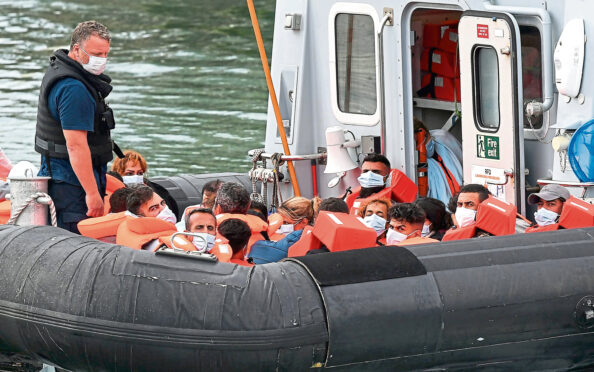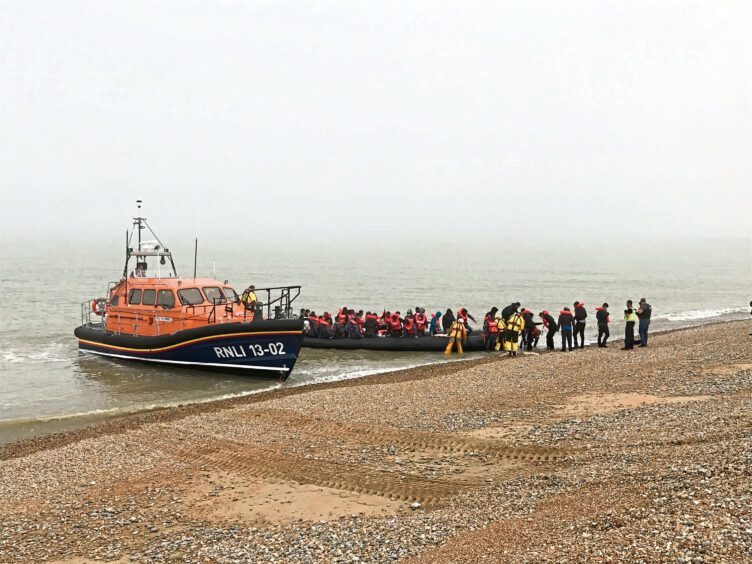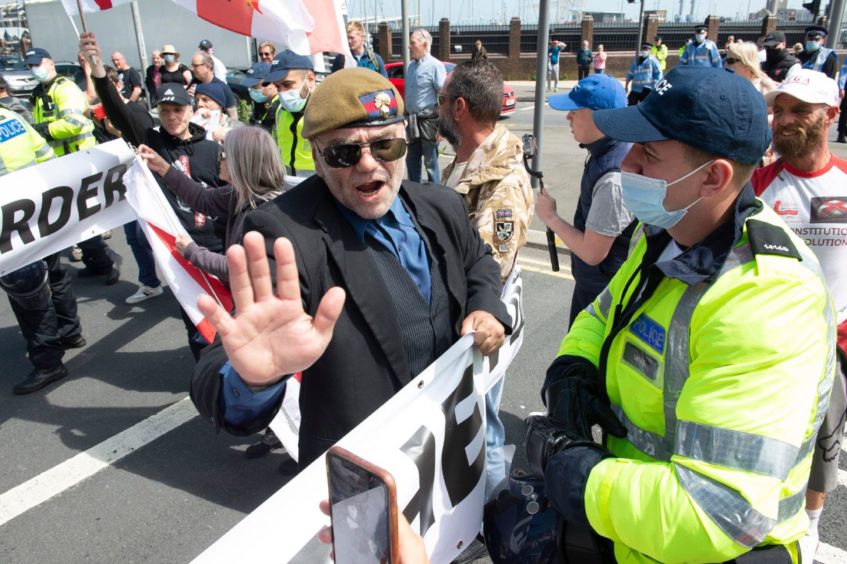
Slowly, out of the mist two specks appear, the tell-tale orange of an RNLI lifeboat contrasts with the grey blanket of fog hanging over the English Channel.
Behind the lifeboat bobs a rigid inflatable with an outboard motor struggling under the weight of the 30 or so men, women and children crammed on board, refugees and migrants risking their lives to try to claim asylum in the UK.
The waves buffet the little craft and it begins to list to one side in the swell as the Dungeness lifeboat shore crew drag it on to the shingle. It is Friday just before 4pm. The RNLI volunteers help the occupants on to the shore and into a stunned silence.
One by one they drop exhausted on to the beach and into the custody of the police and Home Office immigration enforcement officers who have been awaiting their arrival.
This stretch of the Kent coast is a place where St George’s flags fly even when there is no football on. Steeped in the mythology of the Battle of Britain and the White Cliffs of Dover, it is here where the UK Government’s increasingly hard-line immigration rhetoric plays out on a daily basis.
The Dungeness peninsula is far from the green and pleasant dream of England though. Located on a huge windswept spit stretching out into the Channel, the RNLI station sits in a treeless landscape dotted with wooden shacks and rusting fishing equipment. It is just 29 miles from Dungeness to Cap Gris-Nez on the French coast.
In a suitable boat with proper navigation tools and a good engine the crossing can be done in three to four hours. In bad weather and fog, the dinghies and inflatables used by those seeking a better, safer life in the UK – and the people smugglers they trust to bring them over the water – can get stuck at sea for far longer, if they make it at all.
The lifeboat volunteers are reluctant to talk about just how many migrant boats they are called out to assist and the RNLI itself is not allowed to discuss migrant rescues, diverting all questions to the Home Office.
Locally it is a controversial issue and the charity has to tread a fine line between its obligation to save lives and the volatile political environment it finds itself in. Lifeboat call-outs are managed by the UK Government’s Maritime and Coastguard Agency. Each rescue by the RNLI means immediate interception by the police and immigration officers.
On the beach Home Office staff direct the new arrivals to sit down on the ground. One by one they are searched and their possessions bagged up, including any phones and money they have on them. Most have nothing more than the clothes they are in.
A woman is even made to remove her hairband so it can be checked before she is allowed to join her children. There is no resistance, most people are just happy to be on dry land.
The Immigration Enforcement team goes around the crowd with clipboards and sheets of paper, registering the migrants’ country of origin. There are North Africans and people from the Middle East, but the lack of translators makes communication difficult.
In this boat many of the new arrivals are from Afghanistan where the UK is pulling out after almost 20 years of conflict, leaving an unstable and uncertain security situation.
The group is catalogued and split into families and single men, fitted with hospital-style wristbands for identification.
Even in the July heat the detained migrants wear thick winter coats and children are tightly wrapped in blankets to survive the channel crossing. A toddler in a romper suit is helped up the beach by his sister as he stumbles on the stony ground.
Their empty boat is dragged out of the water by a bulldozer and left on the shingle by the lifeboat station. The bottom is littered with discarded cheap life jackets, sodden blankets and half-empty packets of French supermarket biscuits packed for the journey. Crossing into UK waters means that these people are no longer France’s to deal with.
When it left the EU, the UK also left the Dublin Convention on asylum. Whereas migrants would usually be sent to the first EU country they had passed through to claim asylum, the UK can no longer do this and is responsible for hearing the claims of all arrivals.
Home Secretary Priti Patel’s new Nationality and Borders Bill in Westminster will impose even tougher regulations on refugees and migrants arriving through the dangerous channel crossing.
Overall asylum claims and migration to the UK are down but with fewer legal routes available more than 3,500 people have chosen to risk their lives crossing the channel by boat in 2021 so far.
The new legislation will mean that anyone entering the UK through non-legal channels would find it much more difficult to claim asylum, even if their life is in danger in their home country.
Another part of the UK Government’s new hard-line stance is to create offshore holding centres, potentially in Africa in partnership with the strongly anti-immigration Danish government. If the Home Office has its way, migrants like those sat on the beach at Dungeness could soon be removed to offshore processing centres far from both the UK and their home countries as soon as they are intercepted.
Australia has been widely criticised for operating a similar scheme on islands in the Pacific with comparisons drawn to prison camps and criticism of the high costs involved.
The UN’s refugee agency the UNHCR has said that the UK Government plans are “expensive and hard to implement”, as well as potentially violating international law agreed through the UN’s Refugee Convention.
Once they are tagged and sorted the Home Office team marches the detainees up the beach, past the lifeboat station and on to a waiting unmarked coach.
They will end up at one of the Home Office’s reception centres in the nearby towns of Dover or Folkestone before being moved elsewhere.
Some will face swift removal back to their countries of origin, others will enter the complex process of making an asylum claim and trying to prove their identity and their refugee status.
As the loaded bus and Home Office vans drive off toward Dover, oblivious tourists eat fish and chips and take photos of the clapboard fishing shacks. Ten minutes later the lifeboat is back in the station and the beach is empty once more.
Under the new Home Office regime the sight of migrants being marched off to detention units as soon as they reach the beach will be claimed as evidence of success and protecting Britain’s borders but, experts insist, the root causes of forced migration and the plight of refugees will remain.
And the boats will keep coming.

Enjoy the convenience of having The Sunday Post delivered as a digital ePaper straight to your smartphone, tablet or computer.
Subscribe for only £5.49 a month and enjoy all the benefits of the printed paper as a digital replica.
Subscribe

 © Grant Falvey/LNP/Shutterstock
© Grant Falvey/LNP/Shutterstock